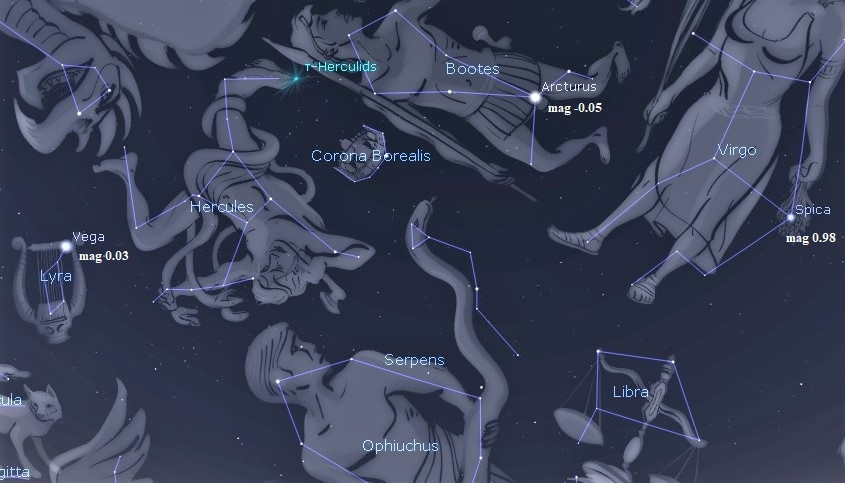This Week’s Sky at a Glance, 2024 May 4 – May 11
This Week’s Sky at a Glance, 2024 May 4 – May 11
In the second century BCE the Greek astronomer Hipparchus of Nicaea ranked the stars according to their brightness in six categories called magnitudes (for greatness). The 20 brightest stars were rated first magnitude and the faintest stars were sixth magnitude. This system was retained for two millennia and standardized in the 19th century when much fainter stars were being detected by telescopes and astrophotography. English astronomer Norman Pogson devised a logarithmic system whereby five magnitudes was a difference in star brightness of exactly 100 times. With this system, a magnitude 1 star is about 2.5 times brighter than a magnitude 2 star, and that one is 2.5 times brighter than a star of magnitude 3.
For many of us, the faintest star we can detect with the naked eye in a dark sky is sixth magnitude (commonly called mag 6). Vega, the fifth brightest star, is mag 0, slightly dimmer than Arcturus and slightly brighter than Capella. With the ability to measure the exact brightness of stars, their magnitudes are often recorded to one or two decimal places, and negative values are used for very bright objects. Sirius is mag -1.4; Jupiter is usually around mag -2.4 and Venus around -4.5. The full Moon is mag -12.6, approximately 400,000 times fainter than the Sun at -26.7. A first magnitude star, of which there are 22, is brighter than mag 1.50; a second magnitude star shines from mag 1.50 to 2.49, and so on.
This Week in the Solar System
Saturday’s sunrise in Moncton is at 6:00 and sunset will occur at 8:32, giving 14 hours, 32 minutes of daylight (6:07 and 8:34 in Saint John). Next Saturday the Sun will rise at 5:51 and set at 8:40, giving 14 hours, 49 minutes of daylight (5:58 and 8:43 in Saint John).
The Moon separates Saturn and Mars on Saturday morning; it is near Mars on Sunday and Mercury on Monday. New Moon occurs just past midnight on Wednesday. Mercury gets brighter over the month and it reaches greatest elongation on Thursday. Jupiter is two weeks from conjunction and is getting lost in evening twilight. Early risers this weekend might catch several meteors from the Delta Aquariid shower rising from the southeast.
The Saint John Astronomy Club meets in the Rockwood Park Interpretation Centre at 7 pm this Saturday. On Sunday evening at 8 pm, tune in to the Sunday Night Astronomy Show via the Facebook page or YouTube channel of Astronomy by the Bay.

